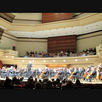Lyric Opera’s Ariodante: Baroque music combined with modern staging
- Mar 20, 2019
- 6 min read
Handel’s Ariodante ran at Lyric Opera of Chicago from March 2 to March 17, 2019.

Although Handel wrote Ariodante almost three hundred years ago, this masterpiece is still up-to-date. This Lyric premiere and new coproduction can be considered contemporary not only because of the modern staging that everybody has been talking about since the opening performance of Ariodante. The main ideas and the morals, which are underlined in its libretto and which are supported by Handel’s fantastic music score, could be applied to our modern life as well. Time keeps moving forward, but humanity stays the same – deceit, lies, inappropriate use of power and physical violence oftentimes dominate over virtues. Looking at this opera and its new staging from this perspective puts Lyric Opera of Chicago in a very good light. By bringing this production to its stage it reminded people about basic human values that shouldn’t be forgotten. Handel’s Ariodante ran at Lyric Opera of Chicago from March 2 to March 17, 2019.
“Ariodante is unquestionably a masterpiece, in which Handel was able to distill his extraordinary genius for both melodic invention and psychological precision,” wrote Anthony Freud, General Director, President and CEO of Lyric Opera of Chicago. “It’s an astonishingly powerful story, in which virtue and villainy confront each other in a riveting way. Noble Ariodante, lovesick Ginevra, dastardly Polinesso, and all the other characters are enormously engaging and intriguing figures, involved in predicaments and relationships that we can connect with as an audience.”
Director Richard Jones chose to update the original story to 1970s Scotland, “where a close-knit, fundamentalist community provides the thought-provoking backdrop.” The actors who spend a great amount of time on stage are dressed in gender-neutral clothes of pale colors. Their motions surprise with their unity and great organization. Yes, they are speechless, but their body language says more than the words. They reflect the feelings of the main characters and the feelings of those who witness the events that take place in this dramatic story. They are like a fluid moving almost insensibly or suddenly freezing with a silent question or a feeling of despair. They are an important accompaniment supporting the main ideas of this production and the singers, whose job is to demonstrate the flexibility of their voices while presenting beautiful arias created by Handel with great talent and mastership.
Another feature that catches attention in this production is puppetry. The scenes with puppets add to Lyric’s Ariodante sincerity, tenderness and even some humor. “A significant feature of the production is that we stage the “Dances” composed at the end of each act as puppet sequences performed by the island community as expressions of their hopes and fears, in response to unfolding events,” wrote Ariodante’s Revival Director Benjamin Davis in the director's notes on this production.
This story is about young and innocent Ginevra, who is a daughter of the King of Scotland. She is betrothed to sensitive, sincere and noble-hearted Ariodante. Ginevra’s father lost his wife and is trying to find psychological comfort in the teachings Polinesso, a preacher who hides a cruel and merciless heart under his clerical robe. The King doesn’t realize that Polinesso is interested in Ginevra who loves noble Ariodante and ignores Polinesso. Full of anger, jealousy and revenge, Polinesso seduces Ginevra’s lady-in-waiting Dalinda, who loves him, to use Dalinda’s feelings and convince her to trick Ariodante by dressing in Ginevra’s wedding gown and pretending that Ginevra is sleeping with Polinesso right before her wedding with Ariodante. By giving Ginevra a drink with a sleeping mixture and making her unconscious, they heartlessly trick Ariodante, who believes that his bride cheated on him. The King, hearing of Ginevra's alleged infidelity, disowns her, while Ariodante is reported dead by suicide. Polinesso uses Dalinda’s trust and sexually abuses her. She is hurt both in a physical and psychological way. Polinesso’s dirty actions go unnoticed and everybody still believes him. The story unfolds in a positive way, though, as Ariodante’s suicide attempt is foiled, Polinesso is mortally wounded in the combat by Ariodante's vengeful brother Lurcanio, Ariodante learns about Polinesso's plot from Dalinda, and the King forgives his daughter and blesses Ariodante and Ginevra to wed.
The story is dramatically rich, intense and sometimes even scary, as each of us realizes that things like that can happen even our days. We feel heartbroken for Ariodante and Ginevra whose happy union is destroyed by lies and deceit and for naïve Dalinda who makes a bad choice and pays a high price for it. However, at the end we realize that justice eventually wins. Villains can seem strong, powerful and sneaky, but their time is usually limited. There is always a person who breaks their evil plots and tells the truth to everyone.
The staging of Lyric’s new production could be criticized for the drawings that were demonstrated by Polinesso to symbolize Ginevra’s supposedly lost moral values and adultery. These drawings had in them males’ intimate body parts, but honestly speaking, they seemed not that graphic comparing to the photographs of males’ intimate body parts that are demonstrated to fifth graders at public schools our days. Besides that, the moments when the drawings were shown were pretty short. They supported the plot and the music and also underlined the overall mood and meaning of this opera.
However, the best part of Handel’s Ariodante is definitely its eternal music. It is an opera seria in three acts that was first performed at Covent Garden in London on January 8, 1735. After having its initial success, the opera became completely forgotten for about two hundred years. In the 1970s, Ariodante began to be revived, and now it is considered one of Handel’s best works. Before this season, Lyric Opera of Chicago has never presented this opera, and its premiere night on March 2, 2019 became Lyric’s bright celebration of Handel’s genius.
Lyric Opera chose an extraordinary cast for this production. Being a famous baroque composer, Handel wrote long, flowery and extremely challenging arias that require singers demonstrate their great vocal skills and mastery, and the cast got the job done with extreme brilliance and joy. The role of Ginevra was presented by internationally acclaimed American soprano Brenda Rae, for whom this role became her Lyric debut. Her vocal mastership, touching artistic skills and overall presentation impressed the audience. Rae’s flexible, strong, yet sensitive voice was shining in such beautiful arias as Orrida a gl'occhi miei from Act 1 and Il mio crudel martoro from Act 2.
The role of Ariodante was performed by world-renowned English mezzo-soprano Alice Coote. Originally, the composer wrote this role for a singer with a castrato voice, which is a male singing voice equivalent to that of a soprano, mezzo-soprano, or contralto. However, now this role is frequently performed by female singers, and Coote demonstrated all the strength, purity, range, and unbelievable power of her voice performing this role. Ariodante is not the first role presented by this wonderful singer where she had to wear a male outfit. Coote has successfully portrayed males in the works of Monteverdi, Gluck, Mozart, Massenet, and Strauss. She is also incomparable in presenting various female roles. Coote’s brilliant presentation of noble-hearted Ariodante and her outstanding vocal skills were bathed in a round of applause after each aria. The audience loved such arias as Scherza infida and Tu preparati a morire from Act 2 and Dopo note from Act 3. Her high notes were simply unbelievable! The audience screamed “Bravo!” to Coote’s well-deserved artistry, mastership and talent.
The role of Dalinda was performed by acclaimed American soprano Heidi Stober, who found the best way to present Dalinda’s inner struggle, pain and difficult experience. Stober has earned critical praise at American and European stages for her sensitive, yet powerful and extremely flexible voice. The audience deeply appreciated Stober’s sincerity and vocal mastery in aria Apri le lucì from Act 1 and aria Neghittosi or voi che fate? from Act 3.
The unpleasant role of Polinesso was fantastically performed by renowned British countertenor Iestyn Davies. His high male voice with somewhat unusual timber became a perfect fit for this role. His extraordinary artistic skills helped Davies create a really sneaky villain, whose evil actions and motives ruined people’s lives. In contrast, the celebrated American bass-baritone Kyle Ketelsen had to present the positive role of Ginevra’s father, King of Scotland, who was heartlessly tricked by Polinesso. Ketelsen, who is well-known at many European and American venues, successfully demonstrated the depth and the strength of his voice in this important role.
The role of Ariodante's vengeful brother Lurcanio was passionately presented by an Iowa-born tenor, first-year Ryan Opera Center member Eric Ferring. The role of Odoardo, favorite of the king, was successfully presented by Canadian tenor Josh Lovell, who is a second-year Ryan Opera Center member.
It is important to mention the actors who contributed their puppetry skills and mastership to this production. Ariodante became a Lyric’s debut for all of these talented people, including English actress, puppeteer and associate puppetry director Kate Colebrook, British actor and puppeteer Sam Clark, Portugal-born actor and puppeteer Tommy Luther, and British actor and puppeteer John Trindle.
The Lyric Opera of Chicago Orchestra was brilliantly directed by famous British conductor Harry Bicket, whose extraordinary conducting skills helped the orchestra perform this score in an unforgettable and touching manner. The work of original director Richard Jones, reviving director Benjamin Davis, set and costume designer Ultz, lighting designer Mimi Jordan Sherin, chorus master Michael Black, choreographer Lucy Burge, puppetry director and designer Finn Caldwell, puppetry designer Nick Barnes, and wigmaster and makeup designer Sarah Hatten is difficult to underestimate as their mastery and professional approach to creating operatic and theatrical masterpieces is incomparable.
“Whoever strives only for honesty can never be happy,” sings Polinesso. Sir, you are wrong. Good always wins; it just needs time.
Natalia Dagenhart
Photo: Courtesy of Cory Weaver

























Comments